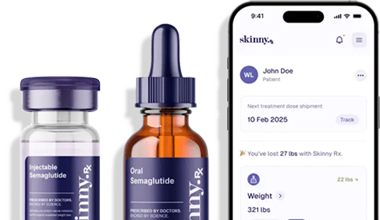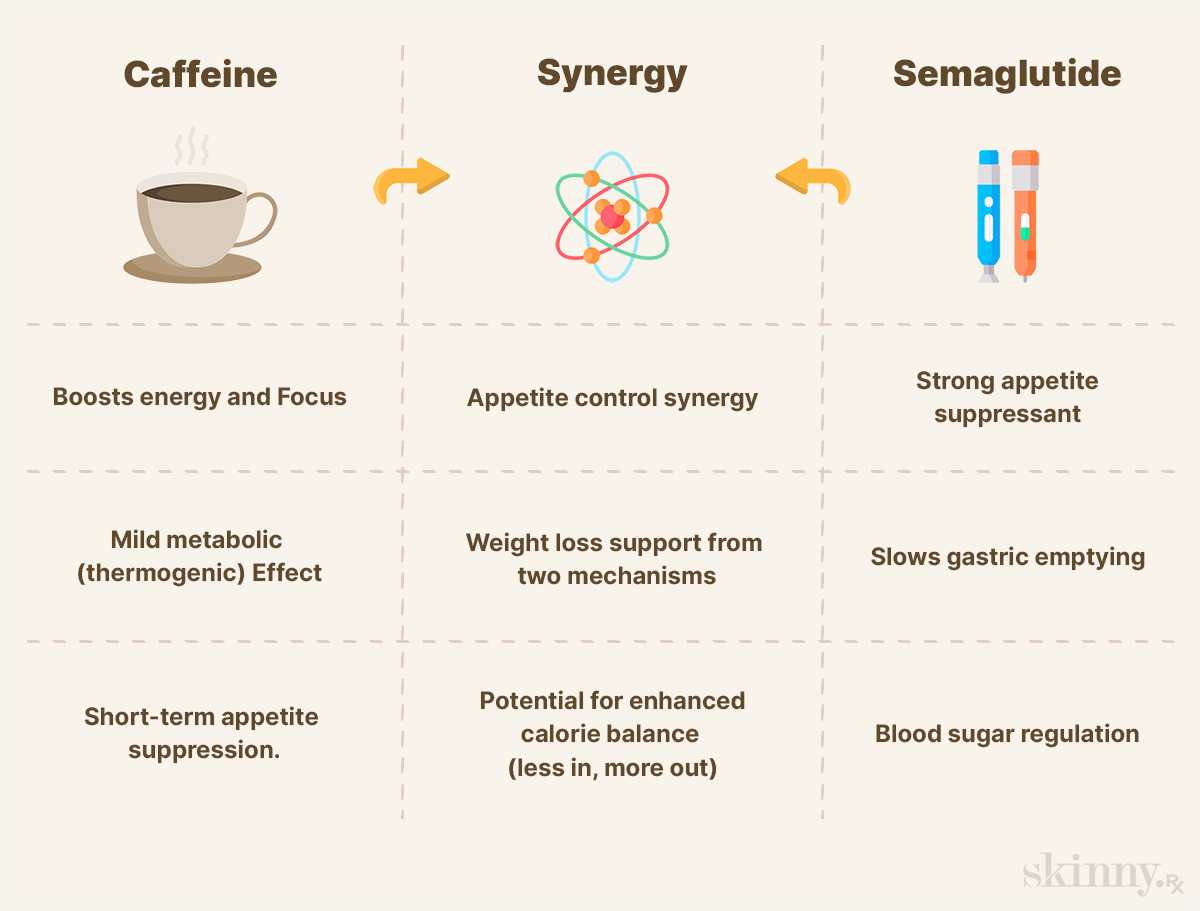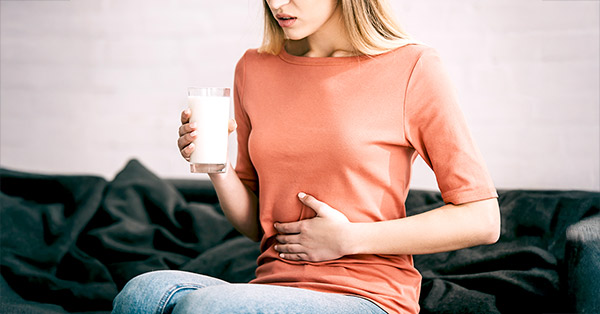
Key Takeaways
Semaglutide can be life-changing, which also means taking stock of your daily habits and dietary choices, including caffeine consumption. Keep these key points in mind if you’re thinking about mixing semaglutide and caffeine for weight loss:
- Semaglutide is primarily an appetite suppressant. Caffeine can also reduce appetite, but it mainly provides energy and alertness.
- The two compounds work well synergistically to tackle both ends of the weight loss equation, reducing caloric intake while increasing energy expenditure.
- Caffeine has a host of noteworthy side effects, some of which are particularly relevant if you’re also taking semaglutide.
- Avoid caffeine anywhere remotely near bedtime, or just after injecting semaglutide if you’re wary of stomach-related side effects.
- Certain dietary supplements, along with a structured exercise routine, can replicate some of the benefits of caffeine if you choose to stay away from supplementation.
Why Caffeine Concerns Semaglutide Users
Semaglutide can be quite effective at supporting weight loss, but jumping on a GLP-1 medication is also a good opportunity to take a closer look at everyday health habits like your caffeine intake.
Combining semaglutide and caffeine can be a potent boon to your weight loss efforts, but you need to understand the risks as well.
Don’t worry—you can still have your coffee on Ozempic. It might even speed up your weight loss. But before you throw back your next cup of hot coffee, let’s throw some cold water on the myths surrounding caffeine and semaglutide and look at some science-based recommendations for safe consumption.
How Semaglutide and Caffeine Interact
One of semaglutide’s principal effects is called gastric emptying; it slows down digestion, helping you feel full for longer. While there may be no direct interaction at play, caffeine exerts a similar influence.
Impact on Appetite Suppression
Caffeine is an adenosine receptor antagonist. Put simply, it can mildly blunt the biological signals that spur us to eat, some studies show. GLP-1 medications behave similarly, though by different internal mechanisms.
If you’re consuming caffeine regularly while on semaglutide, you may notice a mild, temporary diminishment in your appetite, though effects can vary quite a bit from person to person.
Effects on Blood Sugar
Remember, semaglutide was originally used to treat diabetes patients. It has a strong regulatory effect on blood glucose levels by increasing your insulin secretion.
Still, there’s nuance at play here. Some data have shown that consuming caffeine can have the opposite effect, while acute (as in, non-habitual) caffeine intake can raise your blood glucose, especially after a meal.
Potential for GI Side Effects
Caffeine and semaglutide can both be tummy-turners, though not necessarily in the same way. Luckily, studies tell us these effects are mild for most people and shouldn’t interfere with your weight loss efforts.

See How GLP-1 Medications Fit into Your Plan
We offer compounded semaglutide and tirzepatide as part of medically guided weight loss plans. Explore whether this option fits your goals.
Potential Benefits of Caffeine With Semaglutide
Here’s the upside: Caffeine and semaglutide can work well together to enhance your fat loss efforts. That said, you need to know how to use them properly and what effects you can anticipate as a result.
Can Boost Energy
Semaglutide does not directly enhance energy levels. Meanwhile, caffeine’s primary ergogenic (performance-enhancing) effect is boosting energy. Studies show up to 85% of Americans consume caffeine on a daily basis, and predominantly through beverages like coffee.
We all know why—caffeine works wonders as an acute energy supplement. It generally has a half-life (how long it takes your body to clear 50% of the substance from your system) of around five hours, though this varies substantially. You can experience the anti-fatiguing effects of caffeine for up to 10 hours after ingestion in some cases.
Mild Metabolic Enhancement
For the science-inclined, we know caffeine is a decently potent thermogenic. For laypeople, that means it raises your core temperature, kind of like turning up the burner on a gas stove.
However, while caffeine does tangibly “stoke the metabolic furnace,” the effects are both dose-dependent and not particularly extraordinary. Research points to a 3-4% short-term increase from ingesting 100mg, about one 8-ounce cup of coffee.
Appetite Control Synergy
Caffeine and semaglutide may work together the best when it comes to appetite management. Ozempic, Wegovy, and other GLP-1 medications regulate hunger signals and slow digestion. Caffeine, similarly, is a potent appetite suppressant, and it can also spur you to the bathroom shortly after ingestion.

Risks and Side Effects to Watch For
When it comes to stimulants, more is not always better. While caffeine is the world’s most commonly consumed drug, there are plenty of side effects to watch out for if you overdo it.
Increased Heart Rate or Jitters
The caffeine “buzz” is real. As a stimulant, caffeine elevates your heart rate and sensitizes your nervous system, improving reaction time and attentional focus. This surplus of energy can also make you jittery and easily agitated.
If you suffer from chronic fatigue due to semaglutide or a health condition, “switching on” by slamming some caffeine may be tempting. However, you’ll need to monitor your tolerance closely or abstain altogether if you have certain conditions. Talk to your doctor first.
Dehydration
Both semaglutide and caffeine can lead to mild dehydration. Drinking enough water throughout the day is essential, doubly so if you’re consuming caffeine while on semaglutide. If you’re exercising regularly, especially in a warm climate, hydrating adequately is a must-do.
There are different metrics for hydrating properly, but a good place to start is to drink 64oz of water per day at minimum—more if you exercise or live somewhere hot. You may also consider grabbing an electrolyte supplement to replenish lost vitamins and minerals.
Sleep Disruption
Sleep is crucial for weight loss. While caffeine comes with undeniable benefits, you’d be surprised at just how potent it is as an alertness aid. A 2023 analysis of the existing literature recommended not drinking coffee sooner than 8 hours before bedtime; for pre-workout powders, a whopping 13-hour gap is advised.
Evidence-Based Recommendations
Understanding the risks associated with caffeine, especially if you’re taking semaglutide, is crucial. Still, it’s only half the battle. You also need to know how to combat and mitigate these risks if you choose to take both to aid weight loss.
Safe Caffeine Limits for Semaglutide Users
Barring any specific health conditions (if you suffer from chronic disease of any sort, consult with your doctor first), semaglutide users have the same caffeine intake recommendations as anyone else.
The Mayo Clinic recommends a ceiling of 400mg per day for “most healthy adults.” If you have conditions like uncontrolled hypertension, arrhythmia, anxiety, or are pregnant, a 200mg ceiling is advised.
While caffeine content in beverages varies wildly—what you see printed on the label may not be 100% accurate either—that works out to roughly four cups of coffee or two to three energy drinks.
Best/Worst Times to Consume Caffeine
Circling back to its side effects, remember that the data on caffeine’s disruptive effects on sleep are compelling. You’ll want to give yourself a wide berth between your last dose of caffeine and whenever you head to bed.
Try to avoid consuming caffeine after roughly 2 p.m., or eight hours prior to bedtime, whichever is longer. If you’re taking caffeine on your GLP-1 injection day, wait an hour or so after injecting to ensure you don’t double down on any unwanted gastric side effects.
Alternative Energizing Strategies
Caffeine is, for the most part, perfectly harmless and quite potent if dosed appropriately, but it’s not for everyone. Some folks simply cannot fall asleep no matter how early they take caffeine, or struggle to manage the side effects.
If you fall into that camp, there are some caffeine-free options you can try:
- B Vitamins: Some studies have shown that taking a B Vitamin supplement can improve energy and cognition if you’re deficient.
- L-Theanine: An amino acid that may have some positive effects on cognition and mental acuity. You can find L-Theanine in green tea, which often contains caffeine as well.
Then there’s the big one—exercise. Ultra-intense workouts can wipe you out, but research repeatedly tells us that “a moderate-intensity exercise program” improves feelings of vitality and curbs fatigue. Something as simple as a few brief daily walks can go a long way here.
SkinnyRx connects you with compounded GLP-1 treatments like semaglutide and tirzepatide, supported by expert guidance. Take a short assessment to find out if you’re a candidate.


 Medically Reviewed
Medically Reviewed



